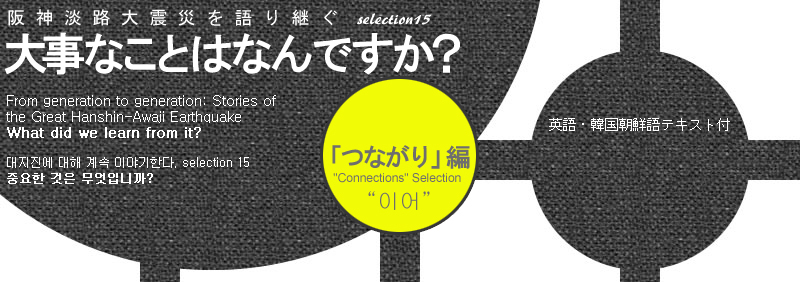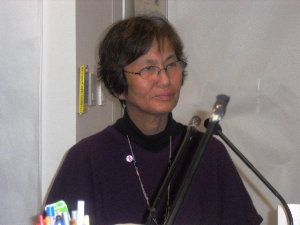The woman’s aspect shouldn’t be forgotten in disaster evacuation shelter management
Reiko MASAI –
NPO Women’s Net Kobe, Representative Director
■Women’s Net Kobe
Women’s Net Kobe is involved in male-female equality and women’s rights activities. The year before the earthquake, we rented a house, ‘Women’s House’, where women could talk openly. We lost that house in the earthquake. We then rented a 6 tatami mat room and opened a telephone counseling service for women. Some women brought their infants along, and we also started children’s support activities.
■In sardine packed evacuation shelters
Women felt stress and upset in evacuation shelters because there was no place to change clothes and children cried at night, and some of them left the shelter and returned to their seriously damaged home. Many women avoided going to the toilet as much as possible because they felt men were looking at them and because of this they also didn’t take enough fluids, so many of them became weak and ill.
■Even at terrible times like this, there were arguments in the home
We received consultation requests about matters like: the loan on the house remains even though we have lost the house; my husband’s business’ customers have become bankrupt; every night, my husband beats the children. All of the women said “Am I being selfish seeking advice about little things that we argue about in the home at a time like this?”
In the Tohoku earthquake disaster hit area
Female self-defense force members, female police officers were dispatched to the disaster hit area. Women’s support groups distributed self-protection cards, and posters. Measures for violence and sexual harassment and attacks against women have improved.
I had nowhere else to live, that’s why I bore it…
A victim of sexual violence who spoke to us said, “If only I had gone to the police at the time.” I remember her saying, “I had nowhere else to live at the time, who could I talk to that about?” I felt we have to do something so that this kind of thing won’t happen again when a disaster occurs.
Putting women’s perspectives into disaster shelter management
One problem is that women are not involved in the management of disaster evacuation shelters. When the numbers of male and female leaders are the same in shelters, management goes smoothly and there is a more cheerful atmosphere.
■Iwate Prefecture restoration meeting
All of the 18 members at the Iwate Prefecture restoration meeting were men. 8,300 women are members of the Iwate Prefecture fishing industry cooperative, most of them worked in fish processing factories. These women lost their jobs when their factories were washed away by the tsunami, leaving them anxious about their livelihood. The restoration meeting should reflect this situation.
■Tohoku earthquake disaster women’s network
We are making proposals to the national government using the findings from our activities. Because most of the restoration work is hard physical work like removing debris and rubble, many women have lost hope in finding work, so we want the government to think about this. We also want the government to ensure that more than 30% of the members of restoration committees are women.
A home where people can live at peace
When a disaster happens, women and children tend to be the targets for venting stress and other things that don’t go well. A domestic violence related murder has already happened in temporary housing for disaster victims. I believe it is important to create an environment where victims can give SOS signals and where they can be provided safe living quarters.
Forming a hand massage team
We went to the disaster-hit area with public health nurses and midwives. It was very difficult to get the local people to speak to us strangers, so we formed a hand massage team. It was a great success, and many people came to see us. Each person was allotted about 10 minutes, and during that short period they opened their hearts and spoke about all kinds of things.
There was one woman who, for about 40 years, had worked in fish processing and went out in her husband’s boat and helped haul in the fishing nets. Women who lived along the coast were very tough.
When we asked, “What do you want?” many replied, they wanted work and a car. On hearing this, a friend got hold of a disused car and proposed they share it.
Don’t forget us
When we were returning from our volunteer activities, I said, “I’m really sorry there was nothing I was able to do for you”. They said, “When the earthquake happened in Kobe, it was so far, we weren’t able to go. But this time, you coming here has given us courage.” We will be very happy if you give us a call once in a while to ask ‘how are you keeping?’” and let us know you haven’t forgotten us.

